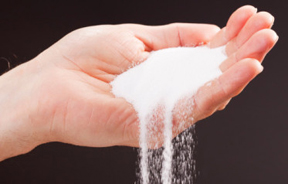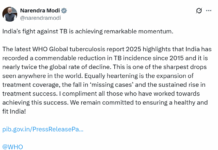HYDERABAD, India: A national salt reduction program in India is set to target reductions in blood pressure, heart disease and stroke, said Professor K. Srinath Reddy at the Annual Conference of the Cardiological Society of India (CSI). Blood pressure is a key theme at the conference and is the focus of a session from the European Society of Cardiology (ESC).
Professor Reddy, who is President of the Public Health Foundation of India and President of the World Heart Federation, said: “Salt consumption in India is high and ranges from 10 to 12 grams per day. Fruit and vegetable, and therefore potassium, intake is low which contributes to a poor sodium-to-potassium balance. Lowering salt intake should help to reduce blood pressure, cardiovascular disease and stroke.”
ESC President Professor Fausto Pinto, who spoke about hypertension, said: “Adopting a healthy lifestyle is the cornerstone for preventing hypertension. To reduce blood pressure, ESC Guidelines recommend salt restriction to 5 to 6 grams per day and increased consumption of fruits and vegetables.”
India’s salt reduction program will have a two pronged approach. A high proportion of salt consumed is added in cooking and at the table, and a campaign will be launched to educate the public about the importance of reducing these sources of salt in the diet. Processed foods, particularly salted snacks, are eaten by a large number of Indians, and work is ongoing with the Food Safety and Standards Agency of India to bring in regulations to restrict the amount of salt in processed foods.
Professor Reddy said: “People in India consume more salt than the body needs and a reduction of at least 3 to 5 grams per day should be achievable without harmful effects. To that end, efforts to develop a national salt reduction program in India are underway.”
The Indian Migration Study found that vegetarians in India had lower blood lipids and blood pressure. One of the factors contributing to vegetarians’ lower blood pressure could be that they eat less salt.
Professor Reddy said: “In India, people who eat meat tend to put more salt on their food. We also know that fruit and vegetables, which are consumed more by vegetarians, contain high levels of potassium which counteracts some of the effects of sodium on blood pressure.”
But he added: “Average consumption of fruits and vegetables in India is about 130 grams per day, which is much lower than the World Health Organization’s recommended 500 grams. Even vegetarians in India eat small amounts of a limited variety. The potassium in fruits and vegetables protects against stroke through its effects on blood pressure. The combination of excess salt and low potassium in the Indian diet need to be urgently addressed.”
Dr HK Chopra, CSI President-Elect, said: “We know that high salt intake has a direct link with greater prevalence of heart attack, stroke and hypertension. Indians eat many foods with a high salt content, including pickle (achar) and snacks like namkeens, samosas and pakoras. Salt restriction is the need of the hour in Indians to reduce the rising menace of premature hypertension, heart attack and stroke.”
He added: “Many Indians have premature hypertension that is undetected. According to the Public Health Foundation of India, hypertension ranges from 20% to 39% in urban areas and 12% to 17% in rural areas. It is estimated that hypertension in India will rise from 140 million people in 2008 to nearly 215 million by 2030 with increased risk of premature heart attacks, strokes and kidney disease.”
Professor Bryan Williams, vice-chairperson of the ESC Council on Hypertension, spoke about hypertension that is resistant to treatment with medication. He said: “In contrast to popular belief, resistant hypertension is an uncommon problem. The reality is that many patients are just not taking their treatment or haven’t been adequately investigated. With regards to device based therapies such as renal denervation for patients with resistant hypertension, there is insufficient evidence to support their use in routine clinical practice.”
He concluded: “Hypertension is the most important and poorly controlled risk factor for heart disease. Most of the life years lost in people with hypertension are due to heart disease. As treatment for other risk factors continues to improve, such as statins to lower blood cholesterol, hypertension will remain the major unresolved issue in preventing ischaemic heart disease and later problems like heart failure.”







